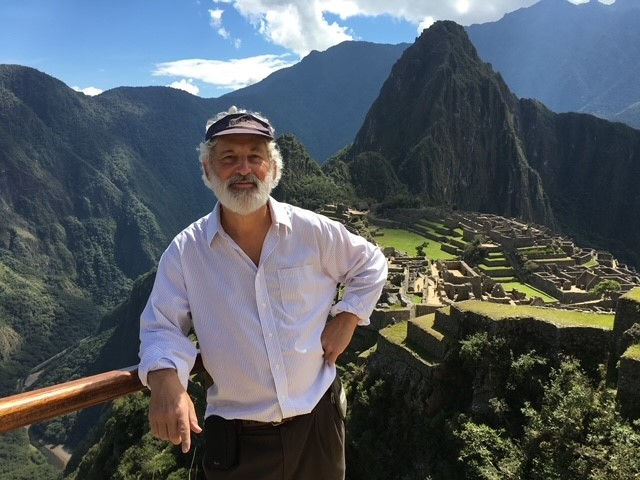With Keats on Machu Picchu
- elichvar
- Nov 14, 2024
- 4 min read
November 14, 2024
by Roy Hoffman, fiction and creative nonfiction faculty
How does reading impact our lives? What words frame our experiences as time unfolds? In this literary travel essay, originally in the Spring 2022 issue of my college alumni magazine, “The Tulanian,” I explored how a line of verse can reverberate—and deepen—even a trip to a vanished mountaintop civilization, and so much more.
Since the semester I took a college class in Romantic poetry at age nineteen, I’ve puzzled over John Keats’s line “A thing of beauty is a joy forever: its loveliness increases.” On a clear morning in Peru, before the pandemic, as my wife and I hiked up Machu Picchu—the ancient Incan site opening before us—I wondered again, as I recited the line from “Endymion,” about the enigmatic notion that loveliness, instead of fading, deepens with time.
Around us were plenty of youth as well as travelers of my generation, all exclaiming, in English, Japanese, German, Spanish at the vistas below. Nancy grasped the hand of our guide, then I, as he hoisted us up a ledge for a better view. A native of Cuzco, Peru, whose first language was the Incan tongue Quechua, the guide was twenty-six, only a year older than Keats when he died. His name was Jonathan.

As we went higher, marveling at the mountainside terraces where Incans had farmed corn, I felt uplifted. The sensation was physical, as we sea-level creatures of America’s Gulf Coast, adjusting to the thin, dry air, climbed with slow but sure footsteps, grateful that our aging bodies still did our bidding. It was emotional, too.
We reached the pinnacle and paused. Looking out at the “apus,” or sacred peaks, I thought of Jonathan’s stories, how Machu Picchu was the estate of Incan king Pachacutec in the 1400s, abandoned by the 1500s, its ruins discovered by archaeologist Hiram Bingham in 1911.
A deep visceral knowledge overtook me. As we stood atop stones smoothed by dwellers half a millennium ago, so others would stand here just as long from now. The architecture of granite, the travelers escaping, to quote Keats’s “Ode to a Nightingale,” “the weariness, the fever, and the fret” of the mundane round—it would recur tomorrow, the next day and next.
“It will never,” Keats said of a thing of beauty, “pass into nothingness.”
●
In 1972 and ’73, my sophomore year at Tulane, I’d taken our planet’s marvels for granted. After two semesters inspired by Professor Andy Antippas’s Romantics class—Blake, Wordsworth, Coleridge in the fall, Byron, Shelley, Keats in the spring—that summer I stuffed Keats next to “Europe on $10 a Day” in my backpack, a notebook in my pocket, and took off for the grand tour like the Romantics had done. With a Eurail pass I saw the Parthenon in Athens, the Forum in Rome, the Eiffel Tower in Paris. They’d always be there for my taking, I believed, in my youthful sense of an unbounded future.
Decades later, when Nancy and I, on a trip to China in 2011, scaled the hillside at Mutianyu, forty miles north of Beijing, to reach the Great Wall, I stepped with awe into the heavens. Here we were ambling part of 13,000-mile path built by Chinese dynasties more than a thousand years before bulldozers and cranes.
I felt exaltation in 2015 when, as the sun rose, we caught first sight of the Taj Mahal. In the presence of this marble dome in Agra, its inlaid gems and story of a grieving emperor building for his wife a spectacular mausoleum, I was humbled. No matter that thousands of others daily made this pilgrimage.
Our visit to Peru rivaled those of India and China, I told Jonathan, and he asked me if it’s true that you can see the Great Wall from the moon.
I have never been to the moon, I answered. If so, maybe you can see Machu Picchu, too.
I had an image of us viewed from a lunar outpost, specks in a ripple of mountains tracing a pre-Columbian path, in cosmic time vanishing the nanosecond we’re glimpsed.
In earthly time, robustly here, we started our descent. Soon we departed the fifteenth century through the twenty-first-century front gate.
●
We headed back to the village of Aguas Calientes, parted ways with Jonathan and repaired to our hotel. At the eco-lodge the bungalow’s glass door slid open to a hot spring in our private garden, a tiny refuge surrounded by a stone wall. Beyond the wall the mountains hurtled upwards.
I climbed in, remembering Keats’s “Ode on a Grecian Urn”: “Thou, silent form, dost tease us out of thought.” The thermal waters quieted me.
The loveliness increases, I realized, because we grow in our capacity to see it, to seize and cherish it. Time gives urgency to that recognition. In the exotica of distant lands, or close to home in a pandemic, and after, we find beauty close at hand, and in the person beside us.
In the hot spring Nancy joined me, stepping into the balm, her blue eyes, as the Andean hours dwindled down, lovelier still.

Roy Hoffman is the author of six books: the novels The Promise of the Pelican, Come Landfall, Chicken Dreaming Corn, and Almost Family, and the nonfiction Alabama Afternoons and Back Home. A native Alabamian who lived in New York City for many years, he resides with his family in Fairhope, Alabama, and has written for the New York Times, The Washington Post and The Wall Street Journal. Find him at royhoffmanwriter.com.